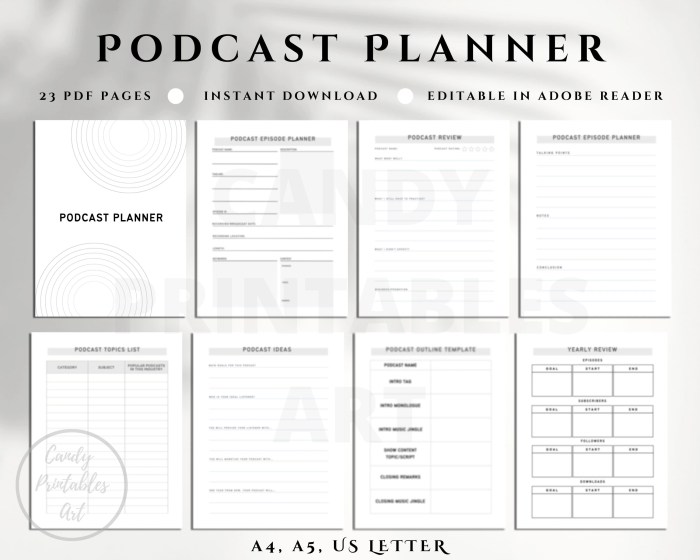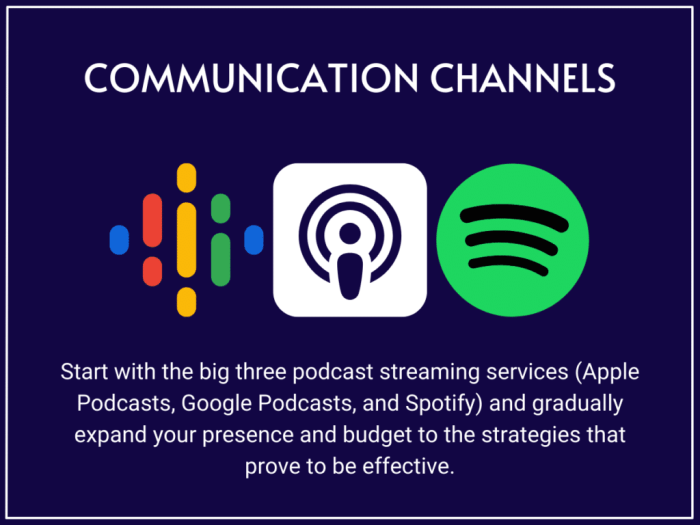Developing a Podcast Content Plan dives deep into the art of creating captivating episodes that resonate with your audience. From researching your listeners to structuring episodes and planning content calendars, this guide will help you craft a podcast that stands out in the crowded digital space.
Whether you’re a seasoned podcaster looking to refresh your content strategy or a newbie eager to make a mark, this comprehensive plan has you covered. Get ready to unleash your creativity and connect with your listeners on a whole new level!
Researching Your Audience: Developing A Podcast Content Plan

When developing a podcast content plan, one of the key aspects to consider is researching your audience. Understanding who your target listeners are can help you tailor your content to meet their preferences and interests.
Identifying the Target Audience
To identify your target audience for a podcast, consider factors such as demographics (age, gender, location), interests, and listening habits. You can also analyze similar podcasts and their audience to get insights into who might be interested in your content.
Importance of Understanding Audience Preferences
Understanding your audience’s preferences is crucial for creating engaging and relevant content. By knowing what topics, formats, or styles resonate with your listeners, you can increase listener retention and attract new followers.
Methods for Conducting Audience Research
– Surveys: Create surveys to gather feedback on content preferences, episode length, or topics of interest.
– Social Media Polls: Use platforms like Instagram, Twitter, or Facebook to conduct polls and gather insights on what your audience wants to hear.
– Analytics Tools: Utilize podcast analytics tools to track listener demographics, behavior, and engagement levels to gain valuable data for content optimization.
Choosing Relevant Topics
When it comes to choosing topics for your podcast, it’s crucial to select engaging subjects that will resonate with your target audience. To ensure the success of your podcast, you need to brainstorm ideas for episodes that will captivate your listeners and keep them coming back for more. Additionally, it’s essential to choose topics that align with the overall theme or niche of your podcast to maintain consistency and attract the right audience.
Tips for Selecting Engaging Topics
- Understand your audience: Take the time to research and analyze the interests and preferences of your target listeners to identify topics that will appeal to them.
- Stay current: Keep up with the latest trends, news, and developments in your niche to ensure that your topics are relevant and timely.
- Diversify your content: Mix up your topics to provide variety and cater to different interests within your audience.
- Consider guest suggestions: Reach out to your audience or industry experts for topic ideas that they would like to hear discussed on your podcast.
Brainstorming Ideas for Podcast Episodes
- Use mind mapping techniques to visualize potential topics and connections between different ideas.
- Keep a running list of topic ideas that come to you throughout the day, so you always have a pool of ideas to pull from.
- Collaborate with your team or fellow podcasters to generate new and fresh ideas for episodes.
- Review feedback and comments from your audience to identify popular topics or questions that you can address in future episodes.
Importance of Aligning Topics with Podcast Niche
Choosing topics that align with the overall theme or niche of your podcast is crucial for maintaining audience interest and loyalty. When your topics are closely related to your podcast’s focus, you establish yourself as an authority in that area and attract listeners who are genuinely interested in what you have to say. By staying true to your podcast’s niche, you can build a dedicated following and create a strong brand identity that sets you apart from other podcasts in the same space.
Structuring Episodes
When it comes to structuring podcast episodes, it is essential to have a clear Artikel that includes an introduction, main content, and conclusion. This helps provide a smooth flow of information and keeps listeners engaged throughout the episode.
Benefits of Consistent Episode Structure
- Enhances listener experience by providing a predictable format
- Makes it easier to plan and create content for each episode
- Builds brand recognition and loyalty through a consistent style
- Helps maintain focus and organization throughout the episode
Popular Episode Formats
There are various formats you can choose from when structuring your podcast episodes. Here are some popular examples:
- Interviews: Bring in guests to share their expertise or personal stories
- Storytelling: Narrate compelling stories or discuss real-life experiences
- Roundtable Discussions: Engage in conversations with multiple hosts or guests on a specific topic
Content Calendar and Scheduling
Creating a content calendar for your podcast episodes is crucial to staying organized and consistent. It helps you plan ahead, stay on track, and ensure you are consistently delivering high-quality content to your audience.
Importance of Maintaining a Consistent Publishing Schedule
Consistency is key when it comes to podcasting. Your audience will come to expect new episodes from you on a regular basis, and maintaining a consistent publishing schedule helps build trust and loyalty with your listeners. It also helps you stay on track with your content plan and ensures you are meeting your podcasting goals.
- Set a regular release day and time for your episodes to keep your audience engaged and coming back for more.
- Consistency helps you build a routine for yourself as well, making it easier to plan and create content in advance.
- Regular publishing also boosts your visibility on podcast platforms, as algorithms tend to favor shows that release episodes consistently.
Tips for Planning Ahead and Scheduling Recording Sessions, Editing, and Release Dates
Planning ahead is essential to maintaining a consistent publishing schedule. Here are some tips to help you stay organized and on track:
- Create a content calendar outlining your episode topics, recording dates, editing schedule, and release dates. This will help you see the big picture and stay organized.
- Block out dedicated time for recording, editing, and finalizing each episode to ensure you stay on schedule.
- Consider batching your recording sessions to maximize efficiency and ensure you have a backlog of episodes ready to go in case of unexpected delays.
- Use project management tools or apps to help you stay organized and on top of your podcasting schedule.
Guest Outreach and Collaboration

Reaching out to potential guests for interviews or collaborations is a key aspect of creating engaging podcast content. By featuring guest speakers on your podcast, you can bring fresh perspectives, expertise, and insights to your audience. Building relationships with industry experts, influencers, or other podcasters for guest appearances can also help you expand your network and reach a wider audience.
Guidance on Guest Outreach
- Research potential guests to ensure they align with your podcast topics and audience.
- Personalize your outreach emails to show genuine interest in collaborating with them.
- Clearly communicate the benefits of appearing on your podcast, such as exposure to a new audience or the opportunity to share their expertise.
- Follow up politely but persistently to increase the chances of securing guest appearances.
Benefits of Featuring Guest Speakers, Developing a Podcast Content Plan
- Bringing fresh perspectives and insights to your audience.
- Increasing the credibility and authority of your podcast by associating with industry experts or influencers.
- Expanding your network and building relationships within your industry.
- Creating engaging and diverse content that keeps listeners interested.
Tips for Building Relationships
- Engage with potential guests on social media to establish a connection before reaching out.
- Offer value to your guests by promoting their work or sharing their content with your audience.
- Attend industry events or conferences to meet potential guests in person and network effectively.
- Collaborate with other podcasters on joint episodes or projects to cross-promote each other’s content.